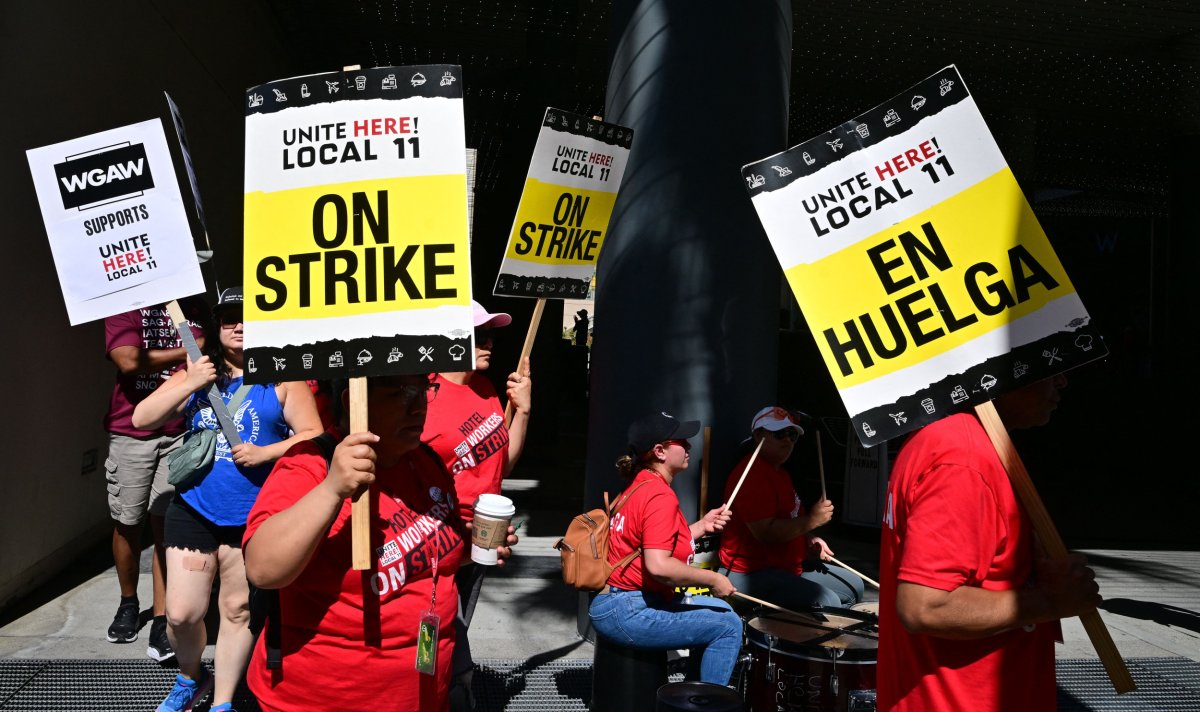After 148 days of striking throughout the "hot labor summer," the 11,500 members of the Writers Guild of America (WGA) ratified their labor agreement with Hollywood studios. The media has since turned its attention to strikes by SAG-AFTRA and the United Auto Workers.
But what about the "largest hotel strike in modern U.S. history," by over 15,000 of Unite Here Local 11's members that began over 100 days ago? Since July 2, hotel workers in Southern California have been on strike demanding a $5 hourly increase, better benefits, and safer workloads. And unlike the WGA and SAG, whose strikes have been relatively well-received by the public, the hotel workers have faced hostility from guests, as well as intimidation, harassment, and violence from management.
At one peaceful rally in Santa Monica, hotel security personnel tackled employee German Martinez. During another action, a hotel in Long Beach used a chain link fence to force striking workers away from the property. During this one-sided clash, a guest scurried around the barricade and punched a worker in the head. The incident received little coverage beyond local outlets.
The media has rendered hotel workers nearly invisible compared to the Hollywood actors and writers. To be sure, when the strike started, there were articles about what hotel workers must endure—long commutes, sleeping in cars—to work in Los Angeles, and "emboldened" workers "From the Docks to Dodger Stadium," standing up to their bosses. Recently, the Los Angeles Times covered the hotel industry's use of unhoused migrants as strikebreakers.
But the volume and consistency of the coverage always pales in comparison to that received by the writers and actors. For instance, a search of The New York Times website for the writers' or actors' strikes yields a plethora of articles, including ones that simply inform us that talks are progressing. In contrast, I counted less than a dozen articles about the hotel workers.
The disparity in the coverage seems to reflect an implicit bias in favor of stories about the entertainment unions, which have higher-income white members, in comparison to the hotel worker members of Local 11, who are predominantly low-wage Latina workers from immigrant communities. For SAG members, their job involves visibility; that is, performing for or speaking to an audience. For WGA members, their work, by definition, requires them to express their voice. In contrast, making housekeepers and their labor invisible has always been an objective of the hotel industry, one the media risks perpetuating in the current dispute.
There was dearth of coverage about the JW Marriott's decision to sic more than a dozen police officers on peaceful picketers in Downtown Los Angeles. In a video posted by Local 11, LAPD officers can be seen breaking up the picket line, and putting organizers in handcuffs. According to Local 11 co-president Kurt Petersen, "This is a hotel that received more than $200 million in public tax dollars to be built, and now the JW Marriott believes they have the right to have the LAPD as their private security force."

This would not be the first time in Los Angeles that employers weaponized the police to break unions at taxpayers' expense. In 1990, the LAPD brutally assaulted and arrested dozens of striking workers and their supporters in Century City. It should not take a phalanx of officers beating down nonviolent marchers to garner coverage.
At the picket line, if security guards had thrown America's favorite soccer coach to the ground, or shoved a fence into The Nanny's body, would the media ignore such events? Of course not. In fact, "Treegate"—when the studios trimmed trees along the Universal Studios picket line to remove shade picketers enjoyed during peak summer heat—was enough to trigger coverage of management's retaliation.
The Associated Press is capable of conducting polls around public support for the writers and actors; yet they have failed to do so with regard to hotel workers. News outlets can analyze how much top Hollywood executives make when compared to striking actors and writers; yet they have failed to conduct a similar analysis of compensation for top hotel executives when compared to striking housekeepers.
We are certainly more familiar with the faces and voices of the actors and writers we see and hear on our screens. But that does not make their labor struggles more or less deserving of attention in comparison to the struggles of the workers we are conditioned not to see. The media needs to do better.
Jonah J. Lalas is a former union organizer and currently a partner at the labor law firm Rothner, Segall & Greenstone, which represents unions, including the Writers Guild of America, West and Unite Here Local 11. He is a PD Soros Fellow and a Public Voices Fellow of The OpEd Project.
The views expressed in this article are the writer's own.
Uncommon Knowledge
Newsweek is committed to challenging conventional wisdom and finding connections in the search for common ground.
Newsweek is committed to challenging conventional wisdom and finding connections in the search for common ground.
About the writer
To read how Newsweek uses AI as a newsroom tool, Click here.





